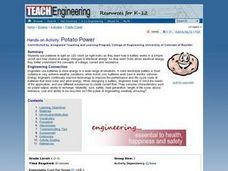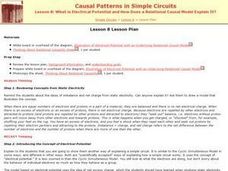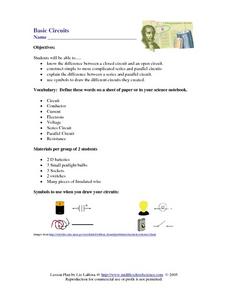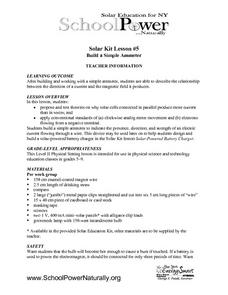Curated OER
Potato Power
Students light a LED clock or light bulb using potatoes. They examine how a battery works in a simple circuit. They determine how chemical energy changes to electrical energy while experimenting with potato powered circuits.
Institute of Electrical and Electronics Engineers
Flashlights and Batteries
Young scholars examine how batteries work, how they provide power to the simple circuit within the battery, and how the switch controls the flow of electrons; students then disassemble a flashlight, and draw a schematic of a flashlight's...
Curated OER
Brown Bag Science
Students discover, through the discovery method, how electricity works. They construct a simple circuit and a parallel circuit, make an electrical motor work and add a switch to turn it on and off.
Curated OER
Green Team
Student explore the relationship of static electricity to current electricity, circuits, electromagnets, electro generators, and public electric utilities. In this Green Team lesson plan, 4th graders participate in hands-on science...
Science Matters
Conductors and Insulators
Get that energy flowing while classes study conductors and insulators. Using a simple circuit, learners test different materials to determine the strength of conductivity. They use their results to classify materials as conductors or...
Curated OER
Electrical Generators
Students study what an electric generator does and its history. In this energy lesson students complete several experiments including building their own electric generator.
Curated OER
Hila Research Centre - Electronics 1
Basically walk your early electronics techs through the vocabulary relating to an electronic circuit. Give them an LED light, a resistor, a battery, and some clips, then have them construct a simple circuit. Specific electronic equipment...
Curated OER
Physics: Electricity and Magnetism
Young scholars draw series and parallel electrical circuits. In this electromagnet lesson, students describe how current changes depend on circuit components. Young scholars use an OHT of a series and parallel circuit to predict the path...
Curated OER
What is Electrical Potential and How Does a Relational Causal Model Explain It?
Pupils examine models of electrical potential. Students discuss the concept of electrical potential and relational causality. They compare models based on electric potential to those with cyclic simultaneous causality.
Curated OER
Series and Parallel Circuits
Students explore the differences between a parallel and a series circuit.In this current lesson students complete several experiments using a light bulb.
Curated OER
Electricity: Series and Parallel Circuits
Fourth graders explore electricity and electrical circuits. They explore series and parallel circuits using Christmas lights. Students pull lights out of each strand of lights. They observe the results when the light bulb is pulled out....
Curated OER
Basic Circuits
Students explain the difference between a closed circuit and an open circuit. They construct simple to more complicated series and parallel circuits. They explain the difference between a series and parallel circuit.
Curated OER
Circuits and Conductors
Fourth graders investigate the concepts of circuits and conductors. In this circuits and conductors lesson set, 4th graders watch demonstrations of circuits and look at images to identify whether they are complete circuits. They test...
Curated OER
Light the Bulb
Students explore electricity. In this power experiment lesson, students determine what is required for lighting a bulb. Students develop an understanding of open and closed circuits, and how energy is formed
Curated OER
Parallel Circuits
Students investigate the way an electrical circuit works. In this physics instructional activity, students use voltmeters and ammeters to measure voltage. They construct a circuit using provided circuit kits.
Curated OER
Electricity
Learners experiment with a series of circuits. In this chemistry lesson, students discuss voltage, resistance and current as they flow through an electrical circuit. They work in pairs to solve the questions.
Curated OER
Electricity
Young scholars identify the relationship between batteries, circuits and voltage. In this physics lesson, students investigate the way batteries are put into different apparatus. They discuss why different machinery need different...
Institute of Electrical and Electronics Engineers
Electric Messages: Then And Now
Learners engage in a instructional activity that is concerned with the history of communication devices that are used today and in the past. They practice using morse code as a look into the past and then cover the modern subjects of...
Bonneville
Simple Solar Tracker
Let the solar cells fight each other for supremacy! Given a functional solar tracker that moves toward light, groups copy the design to build their own devices. They use two sets of solar cells that have reverse polarization, so that the...
Curated OER
Electricity: Going with the Flow!
Fifth graders explore a simple circuit. They experiment with a wire, light bulb and a bettery to see how many ways they can make the light bulb light up. Students describe how they were or were not ablt to light the bulb.
Curated OER
Electric Circuits
Fourth graders investigate complete and incomplete circuits. Using an electrical kit that includes a D-cell battery, wiring, and a flashlight bulb, they construct a complete electric circuit that will light the light bulb. Students...
Curated OER
Build a Simple Ammeter
Students build and work with a simple ammeter to test theories on why solar cells connected in parallel produce more current that in series. Students use the ammeter to indicate the presence, direction, and strength of an electric...
Curated OER
Electricity
Students examine basic electrical components. They build a simple electrical circuit which rings a buzzer. They experiment with conducting and nonconducting materials.
Carnegie Mellon University
Battery Workshop
Introduce your class to the workings and parts of a battery-operated circuit. Pairs of pupils use lemons to make batteries and measure voltage and current with a multimeter. An accompanying worksheet is used for recording values and...

























